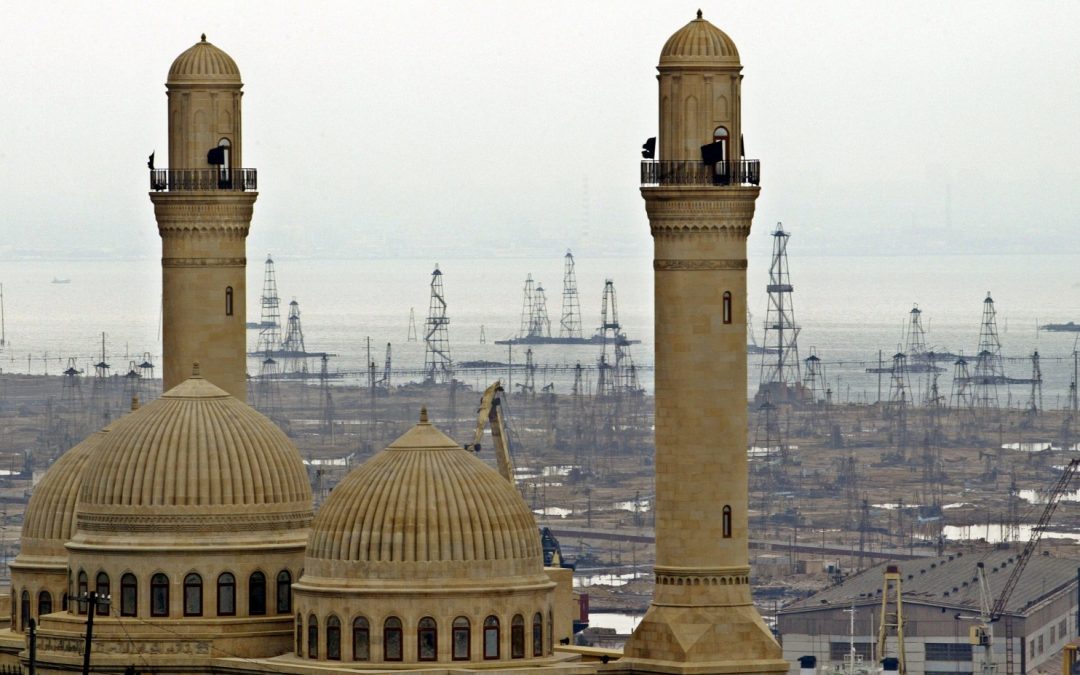Effectively addressing issues of climate change requires a concerted global effort. That is the objective of the upcoming climate talks in Paris: to reach an agreement on climate that involves the full, cooperative participation of all the nations in the world. This goal becomes difficult to achieve, however, when there exists a number of nations whose economic development all rely heavily upon the success of their petroleum reserves. One of these countries is Azerbaijan, whose plans for climate action are complicated by the fact that oil production dominates its small but growing economy.
Azerbaijan has established itself as a smaller but still significant actor in the world’s energy markets: it was producing 1 million barrels a day in 2010, a figure that has since dropped to 855,900 barrels a day in 2014, making up about 1% of global oil production.[[EIA. “International Energy Statistics: Total Oil Supply (Thousand Barrels Per Day).” Accessed November 15, 2015. http://www.eia.gov/cfapps/ipdbproject/iedindex3.cfm?tid=5&pid=53&aid=1.]] As one of five nations to border the oil-rich Caspian Sea, Azerbaijan has successfully exploited its share of the sea’s resources, which has fueled economic growth and development in the country. The significance of oil to Azerbaijan is indicated by the fact that it accounted for 40.4% of GDP in 2014.[[“Azerbaijan Sees Fall in Oil Sector’s Contribution to GDP.” Reuters UK. Accessed November 13, 2015. http://uk.reuters.com/article/2014/10/17/azerbaijan-budget-idUKL6N0SC4BK20141017.]] Its others sectors, such as agriculture and manufacturing, are much weaker and lack the sufficient level of capital and foreign investment necessary for improvement.
The unprecedented success that Azerbaijan has enjoyed in its oil sector in recent decades is due in large part to foreign interest and investment, particularly from the United States, the EU, and Russia. This is owing to the fact that Azerbaijan is situated by some of the largest and most easily accessible oil reserves in the Caspian Sea – and the United States and Russia all want to have a stake in this.[[Mehdiyoun, Kamyar. “Ownership of Oil and Gas Resources in the Caspian Sea.” The American Journal of International Law 94, no. 1 (2000): 179–89. doi:10.2307/2555242.]] Though rich in resources, Azerbaijan alone could not accumulate the necessary capital for the requisite pipeline infrastructure to export their oil. The construction of the Baku-Tbilisi-Ceyhan pipeline in 2005, for example, was backed by the United States and has significantly increased Azerbaijan’s oil exportation capabilities.[[Zimnitskaya, Hanna, and James von Geldern. “Is the Caspian Sea a Sea; and Why Does It Matter?” Journal of Eurasian Studies 2, no. 1 (January 2011): 1–14. doi:10.1016/j.euras.2010.10.009.]]
Something that is noteworthy about Azerbaijan’s oil sector is that it is dominated by the state-owned company, SOCAR (State Oil Company of Azerbaijan Republic). As a state-owned entity and the biggest contributor to Azerbaijan’s economic growth, SOCAR unsurprisingly has tremendous influence over Azerbaijan’s policymaking and consequently enjoys very limited regulation on its operations and activities. The weak state of Azerbaijan’s environmental regulatory institutions is apparent in BP’s own experience with Azerbaijan’s Ministry of Ecology and Natural Resources (MENR), which is supposed to closely monitor BP’s environmental practices: BP found that there was a lack of follow-up and standards were slack. In administering tests to monitor pollutants, for example, MENR was always easily satisfied with test samples, never requested additional data collection, and never conducted in-depth analyses or investigations into BP’s practices.[[Bloomington Energy and Environmental Intelligence LLC. “Environmental Policy and Institutional Reform in Azerbaijan.” Accessed November 13, 2015. http://www.bloomingtoneei.com/PDFs/Environmental%20Policy%20Reform%20Azerbaijan.pdf.]]
Environmental issues are very visible in the country’s oil-related activities. For instance, in the Apsheron Peninsula of Azerbaijan, there exist 200 oil waste lakes. Furthermore, the oil infrastructure is woefully outdated: most oil wells and refineries of on-shore oil fields have leaks, posing significant health threats to the surrounding populations.[[Ismayilova, Khadija. “Azerbaijan Wrestles With Environmental Issues Related to Energy Development.” EurasiaNet, July 20, 2005. http://www.eurasianet.org/departments/civilsociety/articles/eav072105.shtml.]]
Thus, in Azerbaijan, the oil industry is supporting the domestic economy with little regard for environmental impact on its own land, as there is also major air, water, and soil contamination associated with oil activities.[[Shelton, Napier. “Azerbaijan: Environmental Conditions and Outlook.” Ambio 32, no. 4 (2003): 302–6.]] Still, Azerbaijan has submitted an ambitious Intended Nationally Determined Contribution (INDC) for the Paris talks, pledging to cut GHG emissions by 35% using 1990 as a base year.[[“Information to the UNFCCC on the INDC of the Republic of Azerbaijan.” Accessed November 15, 2015. http://www4.unfccc.int/submissions/INDC/Published%20Documents/Azerbaijan/1/INDC%20Azerbaijan.pdf.]] However, given its growing population and its heavy dependence on, and seeming reluctance to part with, its oil production, it will be interesting to see how Azerbaijan will attempt to reconcile their economic interests with their intended plans for emissions reduction. For Azerbaijan and other countries in a similar boat, how they propose to resolve the two will be important to the global discussion on climate change in Paris and beyond.

